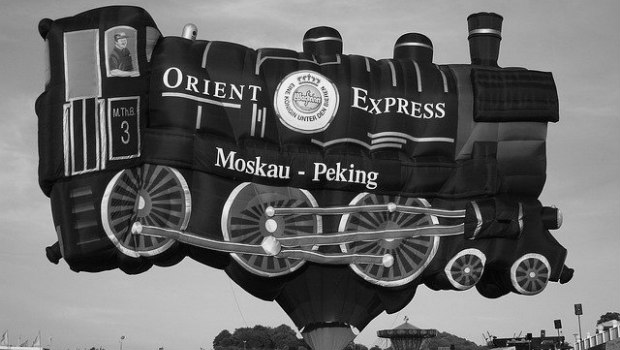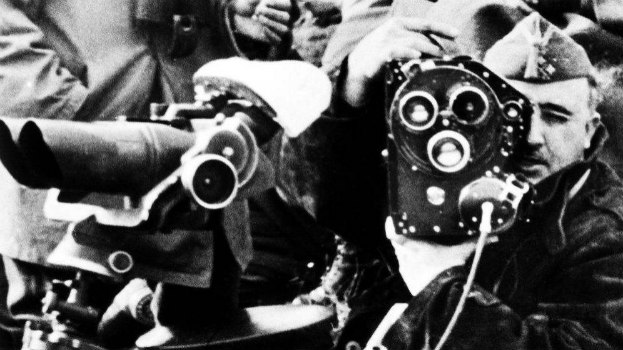BerlÃn 1961. Kennedy, Jrushchov y el lugar más peligroso del mundo. Frederick Kempe
Traducción de Carles Andreu
Galaxia Gutenberg-CÃrculo de Lectores
(Barcelona, 2012)
“La introducción del control fronterizo reinstauró el orden y la disciplina de los habitantes de la Alemania del Este; los alemanes siempre han apreciado la disciplinaâ€.
Nikita Jruschov.
Una de las grandes tristezas de nuestro tiempo es la victoria de la velocidad sobre el pasado. Los barceloneses y extranjeros que circulan por las Ramblas no tienen ni idea de su trascendencia revolucionaria. Sus piedras callan ante la profusión de sombreros mexicanos y lo mismo hacen los cimientos de la Potsdamer Platz, sÃmbolo del BerlÃn moderno, espacio que en su enésima transformación suele identificarse con lo cool y lo alternativo. Si se quiere, la actual capital de Alemania siempre tuvo ese aire corrosivo en bares, atmósfera que combinó a lo largo del siglo XX con ser el lugar más peligroso del Universo, el epicentro donde se condensaban los males que condicionaban el presente y marcaban el futuro. En 1923 fue el pan a tres billones de marcos. Una década después Hitler anunció infaustos porvenires con su nómina a canciller del Reich. En 1945 los mil años quedaron en la ruina, y aquà empieza la historia que lleva a 1961, el muro y el ensayo histórico que Frederick Kempe ha escrito con extraordinaria habilidad, casi como si la profusión de datos correspondiera a una apasionante novela destinada a ser un éxito de ventas. La culpa es de la Historia, construcción que suele aglutinar en sus páginas relatos auténticos que superan sin problemas a la más rebuscada ficción.
Kempe ha sabido leer la aceleración de la Guerra FrÃa al estructurar la obra en varios campos de acción de manera simultánea. Moscú, Kennedy, Adenauer y la RDA. Jrushchov, Washington, la RFA y Ulbricht. La inminencia de un muro. El check point Charlie, un dÃa de octubre y la culminación del miedo con los tanques de dos grandes superpotencias cara a cara y un silencio congelado con lo nuclear en la mente de todos.

¿Cómo se llega a un punto de no retorno? Los manuales dicen, y con razón, que los últimos meses de la Segunda Guerra Mundial y el espectacular avance del ejército rojo en el Este de Europa determinaron la división del continente en dos bloques. Los soviéticos, y asà fue consentido por Eisenhower, ocuparon BerlÃn y a posteriori la urbe prusiana fue dividida en cuatro zonas de ocupación que en realidad eran dos. La simbologÃa adquirió concreción geo-polÃtica con el bloqueo de 1948 y el puente aéreo norteamericano, antesala de la creación de dos Alemanias como metáfora de un conflicto. La Guerra FrÃa se disputó en muchos enclaves del globo, pero ninguno reunió la energÃa de BerlÃn, donde la tensión podÃa estallar en cualquier momento, sobre todo desde que el milagro económico de la reconstrucción hizo entender que los habitantes de cada lado del telón de acero vivÃan en condiciones muy dispares, con prosperidad occidental y penurias orientales.
Este desnivel generó sueños de huida que en 1961 adquirieron proporciones colosales. Los súbditos de la RDA escapaban en masa y tanto como Jrushchov como Ulbricht entendieron que debÃan tapar ese enorme agujero para frenar el colapso del sistema para evitar lo que acaeció, y asà el destino del Comunismo se demoró casi tres décadas, en 1989.
JFK y Dwight D. Eisenhower en Camp David (foto: Robert Knudsen, 1961/D.P.) Por eso desde la misma toma de posesión de Kennedy la cuestión berlinesa se erigió en la protagonista de las relaciones bilaterales entre los EE.UU. y la URSS. La faceta novelÃstica de la musa ClÃo se aprecia hasta en la construcción de los personajes. Nikita Jrushchov y John Fitzgerald Kennedy eran antitéticos. Uno fanfarrón para disimular su pavor a perder el poder, que agarraba con fuerza desde su triunfo en el congreso del PCUS de 1956. Su apariencia de solidez contrastaba con la frágil popularidad de su rival, novato, católico y condenado a una inercia negativa en su etapa inicial en la presidencia por herencia de Eisenhower y titubeos que costaron desastres en frentes de vital importancia. El descalabro en BahÃa Cochinos, la humillación de la cumbre de Viena y la incapacidad de hacer prevalecer la advertencia de su superioridad atómica sobre el enemigo hicieron que su administración fuera ninguneada tanto por la vieja  guardia del Capitolio como por la cúpula del Kremlin.
Lo nuevo pregonado con tanta convicción por JFK olvidó que en polÃtica las perspectivas topan con la realidad. No es lo mismo desear la revolución que poder hacerla, y el desdén por lo viejo fue un error letal que resquebrajó la experiencia de lo elemental y la unión de los aliados. Kempe sostiene con informaciones de alto vuelo y anécdotas cotidianas que el muro podÃa haberse evitado con una acción estadounidense simple, pues el lÃmite entre las dos partes tenÃa una frágil defensa sin pólvora. El espectáculo de eficiencia de Ulbricht, eficaz en su trato con Jrushchov, para instalar alambre con púas y hormigón en un visto y no visto, se alejaba en exceso de la estupidez de Kennedy y Adenauer en su opereta del joven con prejuicios y el viejo autócrata que no se habla con el recién llegado por una rabieta infantil.
Todo era fachada, de los gobiernos hasta el muro. Las pequeñas cosas, hilillos casi invisibles, decantaron la balanza de una auténtica partida de ajedrez con un tablero oscilante por las decisiones de cada contendiente, jugadores con una mente múltiple en la que daban su opinión antes de mover ficha embajadores, espÃas, antiguos prohombres y periodistas dispuestos a obtener la exclusiva definitiva. El lance se dirimió en despachos y en la calle. Los hombres encorbatados meditaban entre humo y gritos mientras algunos soldados y transeúntes apretaban teclas inesperadas, lo que hizo del duelo un caos en el que no bastaba ordenar ideas y aplicarlas a rajatabla. Cada jornada deparaba un sobresalto, cada hora contenÃa en su simiente un órdago para potenciar la absurdidad y la precipitación.
Jrushchov apretaba una palanca y Kennedy cedÃa, y asà fue desde enero de 1961. Las señales de humo soviéticas se confundieron al aterrizar a las barras y estrellas. El hombre del zapatazo en la ONU presionaba con sus modos de campesino y la sofisticación de JFK flaqueaba, atónita y desesperada, estéril ante un vendaval al que no sabÃa ubicar pese a las toneladas de información de los servicios secretos. En este sentido la mansedumbre se expresa en la violación de los acuerdos de posguerra y el desprecio por todos aquellos que anhelaban abandonar la zona Este de BerlÃn para abrazar Occidente y una existencia con más recursos e imposiciones menos gravosas. La pasividad del presidente de los Estados Unidos, por su ético horror al imaginar una conflagración termonuclear, valló y reafirmó el status quo del Telón de Acero, que desde el 13 de agosto de 1961 también fue palpable. Si en 1956 los yanquis se lavaron las manos en HungrÃa, lo de un lustro más tarde fue la rúbrica de lo estático, aumentado y propulsado por apuestas de pocos que molÃan la esperanza de muchos. Los bloques estaban para quedarse. La Historia se congeló y entretanto sus vedettes desaparecieron. Kennedy asesinado, Jrushchov destituido. Las frases y la leyenda ofuscaron su legado. Pasaron las generaciones y la luz no se encendió para los berlineses hasta noviembre de 1989. SerÃa discutible analizar hasta que punto la desaparición del Comunismo ha sido positiva para los intereses del Planeta, pero lo que sà queda claro tras la lectura del ensayo de Kempe es que la incompetencia es más importante que soltar un Ich bin ein berliner para que te aplaudan, eso y la calamidad de poseer un infinito arsenal de destrucción masiva y no imponer su pánico al oponente aun sin apretar el botón de muerte universal.
Jordi Corominas i Julián
http://corominasijulian.blogspot.com






